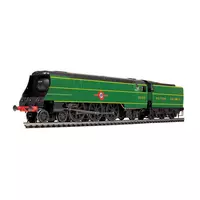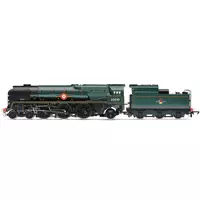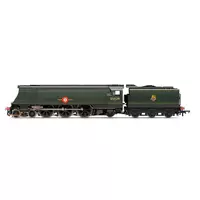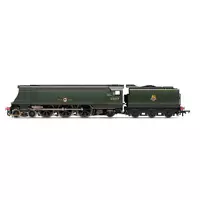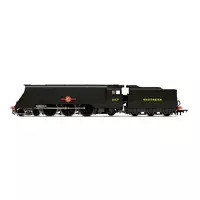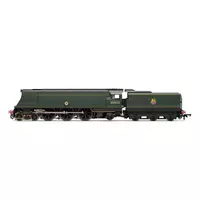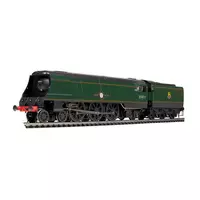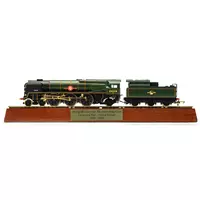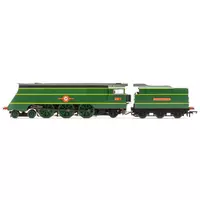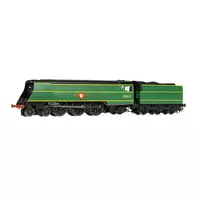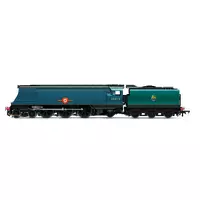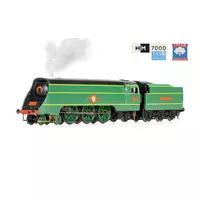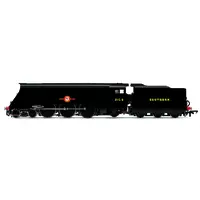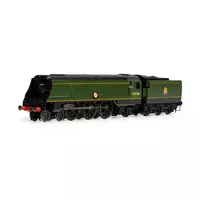Manufacturer catalogue image - please note that pre-release images may be CAD renders or CGI images rather than photographs
Prototype Eras
Era 4 (1948 to 1956) British Railways Early Crest
Era 6 (1967 to 1972) British Rail Blue (Pre-TOPS)
Manufacturer description
Conceived in 1937 when Oliver Bulleid became Chief Mechanical Engineer of the Southern Railway, the Merchant Navy Class represented Bulleid's vision for a quick accelerating, mixed traffic 4-6-2 locomotive, equally capable of hauling passenger services (such as the Golden Arrow and Atlantic Coast Expresses), or freight workings, to a speed of around 75mph.
Mainly designed from the Brighton Works Drawing Office, under C.S Cocks, Bulleid, always aware of practical applications and costing implications, ensured that the best design practices of the time were applied to the new locomotive. Like his mentor, Nigel Gresley, Bulleid was a technically arrogant CME, an advocate of locomotives being driven hard and to brisk schedules and this materialized in his design ideas. In 1934, Bulleid had been opposed the use of streamlining, but for the Merchant Navy's 'air-smoothed' design it suited his purposes, being easy to clean mechanically and hiding the boiler's external pipes, which in turn meant they could be run for function, rather than aesthetics.
Opting for a welded steel firebox, instead of traditional copper construction for reduced weight and pressure benefits, Bulleid was able to make the three equally sized cylinders smaller, at 18', and better balanced. New X-ray inspection techniques were specifically developed to monitor wear to the welded areas, whilst the newly designed Bulleid Firth Brown 6" 2' driving wheels reduced the amount of hammer blow to the rails, also resulting in less wear. Of all the new features Bulleid incorporated into the design, perhaps the most ingenious and, ultimately, most controversial was his decision to totally enclose the valve motion in an oil bath to prevent attritional wear through grit ingress.
Despite the onset of war in 1939, Bulleid's design was accepted by the wartime Railway's Executive Committee and production commenced through November 1940 at Eastleigh Works, the first loco, 21C1 Channel Packet, being named on March 10, 1941. The reaction to the new design was very much polarized into two camps: the footplate staff were dramatically in favor as, for the first time in the Southern's history, they had been offered an engine that was more powerful than existing stock, as well as having an ample reserve of power to assuage the engineman's constant fear of being left short of steam. On the other hand, maintenance staff cursed the design, multiple panels having to be removed to gain access to even the most minor of mechanical items, which led to an increase in maintenance time.
Officially, the Merchant Navy class were constructed in three batches of ten: 21C1-21C10, 21C11-21C20 and 35021-35030. In practice though, 21C2 incorporated lessons learnt from 21C1, which were then applied in turn to 21C3-10 and this lesson was repeated for the next two batches, resulting in a huge variation in the appearance of the locomotives.
Locomotive 35024 East Asiatic Company entered traffic on November 13, 1948 at Exmouth Junction and had its naming ceremony at Waterloo Station on May 5, 1949, where HRH Prince Axel of Denmark officially named the locomotive. East Asiatic Company remained at Exmouth until February 26, 1959, when it went in to works for its rebuild.
Catalogue listing
Model details
Prototype information
* Class names often change over the lifespan of a locomotive, so this is not necessarily the class name used by the operator in the period modelled.
Supplier links are provided for your convenience and do not guarantee that the product is currently available. RailwayModels.uk is not a representative of these suppliers, but may receive a commission when purchases are made through links on this page.

